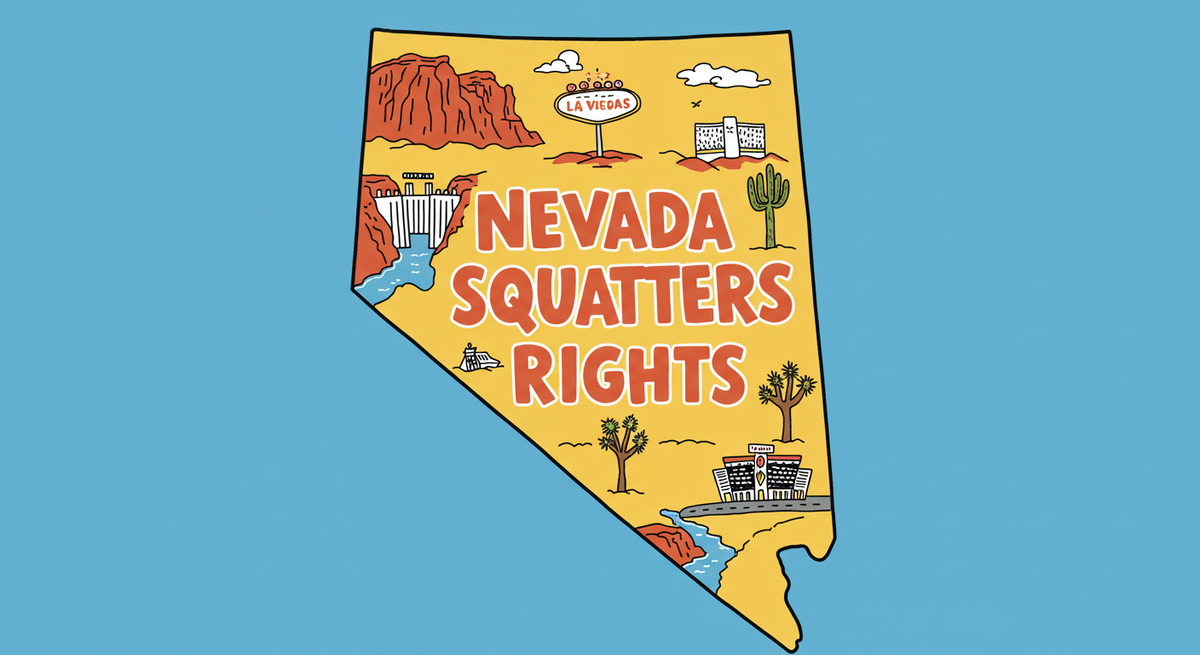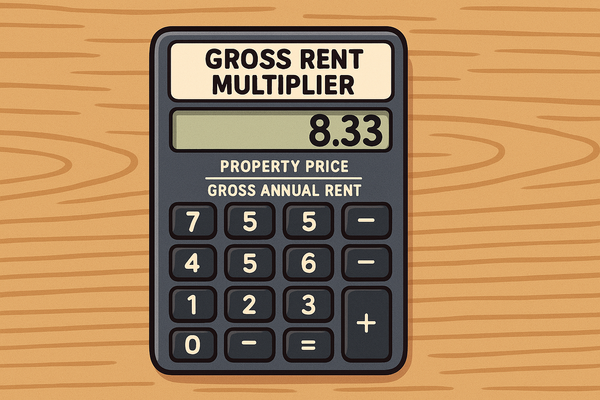Nevada Squatters Rights Guide: Understanding Adverse Possession Laws
Continuous possession requirement: Occupation without significant interruptions for the full 5-year period (1,825 consecutive days)

From sovereign citizens filing bizarre legal documents to the rise of the infamous "Squatter Hunter," Nevada is brewing with fascinating squatters rights cases that challenge property owners and law enforcement alike.
The Silver State's legal structure—with its 5-year adverse possession timeline and criminalization of squatting—creates an interesting environment where property rights battles play out against the backdrop of Las Vegas luxury homes and rural desert parcels.
This comprehensive guide navigates Nevada's complex squatters rights terrain, equipping property owners with the knowledge needed to protect their real estate from unauthorized occupants who might attempt to claim legal ownership through adverse possession–especially the truly crazy ones.
Introduction to Squatters' Rights in Nevada
- Definition of squatters vs. trespassers in Nevada: Under Nevada law, a squatter is someone who occupies a property without legal ownership or the property owner's permission, while a trespasser is someone who enters property unlawfully but doesn't intend to claim ownership rights.
- Basic overview of adverse possession in Nevada: Adverse possession is a legal doctrine that allows a person who possesses someone else's real property for a specific period to gain legal ownership if certain conditions are met.
- Why property owners should understand these laws: Understanding Nevada's adverse possession laws is crucial for property owners to protect their property rights and prevent unauthorized occupants from potentially claiming ownership.
- Historical purpose of adverse possession laws: These laws originally encouraged productive use of land and resolved disputed property ownership when documentation was less reliable.
Squatter Snippet: Real Case from Nevada
In 2016, the Catania family of Las Vegas lost their luxury home to foreclosure. Shortly after, a self-proclaimed "sovereign citizen" named Thomas Benson filed bizarre legal documents claiming ownership of the 5,400-square-foot property.
Benson filed an "Ecclesiastical Deed Poll" stating he was a "living flesh and blood, sentient man" and included pages with blue ink footprints labeled "Proof of Life Footprints of the Living Man on the Land."
This case highlights the extreme lengths some unauthorized occupants will go to in Nevada to claim property rights, and why understanding the state's squatter laws is critical for property owners.
Key Timeline: Statutory Period in Nevada
- Required occupation period: 5 years in Nevada
- Continuous possession requirement: Occupation without significant interruptions for the full 5-year period (1,825 consecutive days)
- Comparison with neighboring states:
- California: 5 years
- Arizona: 10 years
- Utah: 7 years
- Timeline exceptions:
- Military service may pause the timeline
- Legal incompetence/disability may extend the period
CHART: Adverse Possession Timeline Comparison
| State | Required Years | Special Conditions |
|---|---|---|
| Nevada | 5 years | Must pay property taxes for entire period |
| California | 5 years | Must pay property taxes; color of title may reduce to 5 years |
| Arizona | 10 years | 3 years with color of title and tax payment |
| Utah | 7 years | Tax payment required |
Quick Guide for Property Owners
Nevada ranks among states with shorter adverse possession periods at only 5 years, creating urgent concerns for property owners. What's particularly noteworthy is that Nevada explicitly classifies squatting as a criminal offense under unlawful occupancy laws (NRS § 205.0817), making it a misdemeanor.
This criminalization provides property owners with additional legal leverage compared to many other states. In the notable Flash Shelton case of 2023, a property owner in Nevada developed an unconventional but effective technique of "counter-squatting" – legally moving into his own property while squatters were there and making conditions uncomfortable until they left.
- Know your timeline: Squatters can claim rights after 5 years of continuous occupation in Nevada
- Documentation matters: Keep property tax receipts, property records, and inspection logs
- Regular monitoring required: Vacant properties in Nevada are particularly vulnerable
- Legal obligation: Self-help eviction methods are illegal in Nevada
- Act quickly: The longer squatters remain, the stronger their potential claim
- Proper notices: Follow Nevada's legal procedures when removing unauthorized occupants
Prevention: Protecting Your Property
Nevada's unique climate and real estate landscape present specific challenges for property owners. Las Vegas, in particular, saw a 43% increase in squatting cases in 2015, with over 4,400 reported incidents.
Nevada courts place significant emphasis on evidence of regular property monitoring when evaluating adverse possession claims. The state's transient population and high number of vacation homes make regular surveillance crucial. Courts also look favorably upon property owners who can demonstrate consistent tax payments and maintenance.
- Regular inspections:
- Visit property at least monthly
- Document each visit with photos/notes
- Consider hiring a property management company for regular monitoring
- Effective security measures:
- Secure all entry points with commercial-grade locks
- Consider alarm systems with remote monitoring
- Install motion-activated lighting and cameras
- Use smart home technology to monitor property remotely
- Clear signage:
- Post "No Trespassing" signs visibly in accordance with Nevada law
- Mark property boundaries clearly with fencing when possible
- Property management options:
- Hire professional management for vacant properties
- Consider short-term rental options for seasonal properties
- Documentation practices:
- Keep property tax payment records for all years of ownership
- Maintain utility connections even in vacant properties
- Take dated photographs regularly and store securely
- Establish relationships with neighbors who can alert you to suspicious activity
CHART: Property Risk Assessment Matrix
| Property Type | Risk Level | Recommended Prevention | Estimated Cost |
|---|---|---|---|
| Vacant Land | High | Fencing, regular inspections, clear signage | $$$-$$$$ |
| Abandoned Building | Very High | Security system, reinforced entry points, property management | $$$$-$$$$$ |
| Seasonal Property | Medium | Smart monitoring, property manager, neighbor vigilance | $$-$$$ |
| Investment Property | Medium-High | Professional management, tenant screening, regular inspections | $$-$$$ |
Removing Squatters: Step-by-Step Process
Nevada's approach to squatter removal is distinct from many states because it criminalizes squatting under NRS § 205.0817. This classification enables property owners to request police intervention as the first step in removal, rather than immediately pursuing civil action.
Nevada Revised Statutes sections §11.070, 11.110, 11.150, and 11.180 establish the legal framework for adverse possession, while Clark County's justice court rules govern the eviction process. Property owners who attempt illegal "self-help" evictions in Nevada can face misdemeanor charges and potential civil liability.
- Document the situation:
- Take photos/video of occupation
- Gather ownership documents including property tax receipts
- Collect evidence of the squatter's presence
- Contact law enforcement:
- Report unlawful occupancy under NRS § 205.0817
- Request squatter removal as a criminal matter
- File Notice of Retaking Possession within 24 hours:
- Must be properly formatted according to Nevada justice court rules
- Post notice prominently on property
- Wait 21 days for squatter response:
- Squatter may file legal action if they believe they have rights
- If no response, squatter must vacate within 4 days after notice
- If squatter doesn't leave, file unlawful detainer action:
- File in justice court in the county where property is located
- Include all required documentation including proof of ownership
- Attend court hearing
- If successful, obtain order for removal
- Sheriff enforces removal, not property owner
- Store abandoned personal property for 14 days
- What NOT to do:
- Do not change locks yourself while squatters occupy property
- Do not shut off utilities to force squatters out
- Do not remove squatter's personal property without court order
- Do not threaten or intimidate squatters
- Do not use physical force to remove squatters
- Do not enter property without notice while occupied by squatters
- Timeline expectations:
- Notice period: 21 days
- Court processing: 2-4 weeks
- Eviction enforcement: 1-2 weeks after judgment
CHART: Eviction Process Timeline
Nevada's eviction process for squatters follows specific timelines established in NRS Chapter 40 and the Nevada Rules of Civil Procedure. According to recent Clark County Justice Court statistics, the average processing time for unlawful detainer actions is approximately 4-6 weeks from filing to enforcement.
However, the criminalization of squatting under NRS § 205.0817 can sometimes expedite this process compared to purely civil proceedings in other states. A claim from the Eviction King of Las Vegas states that about 70% of unlawful detainer cases are resolved before reaching a court hearing when proper notices are filed.
[Discovery of Squatter] → [Documentation: 1-2 days] → [Police Report: 1 day] →
[Notice of Retaking Possession: 21 days] → [If unsuccessful, File Unlawful Detainer: 1 day] →
[Waiting for Hearing: 2-3 weeks] → [Court Hearing: 1 day] →
[If successful, Wait for Order: 3-5 days] → [Sheriff Enforcement: 7-14 days] → [Property Returned]
Total estimated timeline: 4-8 weeks
Legal Requirements for Adverse Possession
Nevada courts interpret the traditional "OCEAN" criteria (Open, Continuous, Exclusive, Adverse, Notorious) quite stringently compared to many other states. The Nevada Supreme Court has consistently upheld these requirements, most recently in the April 2024 case of Jones v. Ghadiri (140 Nev. Adv. Op. 27), which clarified the distinction between adverse possession and prescriptive easements.
The court emphasized that adverse possession requires not just the standard elements but also payment of property taxes. Nevada places the burden of proof squarely on the person claiming adverse possession, requiring clear and convincing evidence rather than merely a preponderance of evidence.
- Hostile/Adverse Claim
- In Nevada, "hostile" doesn't mean violent but indicates occupation without the legal owner's permission
- Nevada courts follow an objective standard that the squatter's use must be without authorization
- The possession must actively contradict the owner's property rights
- Open and Notorious Possession
- Must be visible and obvious to anyone observing the property
- Courts look for evidence like maintenance, receiving mail, visible improvements
- The occupation must be conspicuous enough that neighbors would recognize the squatter as the apparent occupant
- Exclusive Possession
- Squatter must possess the property exclusively, just as a legitimate owner would
- Must prevent others from occupying the property
- Sharing the property with others, including the legal owner, invalidates the claim
- Continuous Possession
- Full 5-year period (1,825 consecutive days) without significant interruptions
- Even brief vacations could potentially reset the statutory clock
- Seasonal use may not qualify as continuous possession
- Property Tax Payment
- Nevada requires payment of property taxes for the entire 5-year statutory period
- Tax receipts serve as crucial evidence in court proceedings
- Failure to pay property taxes invalidates an adverse possession claim
CHART: Adverse Possession Requirements Matrix
| Requirement | Required in Nevada? | Evidence Courts Accept | Common Pitfalls |
|---|---|---|---|
| Hostile/Adverse Claim | Yes | Documentation of entry without permission, absence of rental agreements | Mistaken permission, verbal agreements |
| Open & Notorious | Yes | Witness testimony, property improvements, mail receipt | Hiding occupation, minimal visibility |
| Exclusive | Yes | Evidence of sole control, preventing others' access | Sharing space, allowing others to use property |
| Continuous | Yes | Utility bills spanning 5 years, consistent mail delivery | Temporary absences, seasonal use only |
| Payment of Taxes | Yes | Tax payment receipts for full 5-year period | Missing payments, incomplete records |
Frequently Asked Questions
- "Can I remove squatters myself in Nevada?"
- No, self-help eviction is illegal in Nevada under state law
- Must follow legal eviction process through proper channels
- "Do squatters have to pay property taxes in Nevada?"
- Yes, Nevada explicitly requires tax payment for adverse possession claims
- Tax payment for the entire 5-year period is mandatory
- "What's the difference between a squatter and a trespasser in Nevada?"
- Trespassers: Short-term unauthorized presence without intent to claim rights
- Squatters: Ongoing occupation with potential adverse possession claim
- "Who should I contact first in Nevada - police or justice court?"
- For squatters: Police first, as squatting is criminalized in Nevada
- For holdover tenants: Justice court for civil eviction proceedings
- "Can squatters claim abandoned property in Nevada?"
- Yes, if all adverse possession requirements are met, including tax payments
- Abandonment may actually strengthen their claim under certain circumstances
- "How quickly can I evict a squatter in Nevada?"
- Typical timeline: 4-8 weeks
- Factors affecting timeline: law enforcement response, court schedule, evidence quality
CHART: Decision Tree for Property Owners
Nevada's unique criminalization of squatting through NRS § 205.0817 creates a different decision path for property owners compared to most states. The Las Vegas Metropolitan Police Department and other Nevada law enforcement agencies distinguish between criminal trespass (immediate, short-term unauthorized entry) and squatting (longer-term unauthorized occupation).
According to the Legal Aid Center of Southern Nevada, property owners should first determine if the occupant might have a legitimate claim before proceeding with either criminal or civil remedies.
Discovered Someone on Your Property
├── Emergency/Dangerous Situation? → Yes → Call Police (911)
│ └── No ↓
├── Recent Entry (Less than 24 hours)? → Yes → Call Police Non-Emergency (Trespasser)
│ └── No ↓
├── Evidence of Established Occupation? → Yes → Call Police to Report Unlawful Occupancy
│ └── No ↓
├── Former Tenant Who Stayed Beyond Lease? → Yes → File Civil Eviction in Justice Court
│ └── No ↓
└── Uncertain Situation → Consult Attorney or Legal Aid Center of Southern Nevada
Recent Legislative Changes in Nevada
Nevada has strengthened its approach to squatting in recent years with several legislative updates targeting unauthorized property occupation. Assembly Bill 386, passed in 2023, expanded the definition of unlawful occupancy and increased penalties for repeat offenders.
The bill modified NRS § 205.0817 to classify subsequent squatting offenses as gross misdemeanors rather than simple misdemeanors. Additionally, in February 2025, Assembly Bill 223 was introduced to further streamline the squatter removal process by allowing expedited hearings for clear cases of unlawful occupancy.
The Nevada Supreme Court ruling in Jones v. Ghadiri (April 2024) also clarified the distinction between adverse possession and prescriptive easements, reinforcing the requirement for property tax payment.
- Recently Passed Laws:
- Assembly Bill 386: Passed June 2023, this law increased penalties for repeat squatting offenses
- Impact on property owners: Stronger deterrents against professional squatters
- Effective date: October 1, 2023
- Pending Legislation:
- Assembly Bill 223: Currently in committee as of February 2025
- Proposed changes: Expedited hearing process for clear squatting cases
- Expected vote: Spring 2025
- Legislative Trends:
- Nevada is moving toward stronger property owner protections
- Trend toward viewing squatting as a criminal rather than civil matter
- Increasing penalties and streamlining removal processes
State-Specific Considerations
- Color of Title in Nevada:
- Definition: Documentation suggesting ownership but legally insufficient
- Impact on statutory period: Does not reduce the 5-year requirement
- Having color of title may strengthen an adverse possession claim but is not required
- Burden of proof requirements:
- Squatter must prove all elements of adverse possession by clear and convincing evidence
- Property tax payment records are particularly crucial in Nevada courts
- Recent legal developments:
- Jones v. Ghadiri (April 2024): Clarified distinction between adverse possession and prescriptive easements
- Emphasized tax payment requirement for adverse possession claims
- How Nevada differs from neighboring states:
- Criminalization of squatting (unique among neighboring states)
- Strict property tax payment requirement
- Streamlined process for removal following police intervention
CHART: Nevada vs. Neighboring States Comparison
| Factor | Nevada | California | Arizona | Utah |
|---|---|---|---|---|
| Statutory Period | 5 years | 5 years | 10 years | 7 years |
| Color of Title Impact | Minimal | Reduces to 5 years | Reduces to 3 years | Minimal |
| Tax Payment Required | Yes | Yes | Yes | Yes |
| Criminal Status | Misdemeanor | Civil matter | Civil matter | Civil matter |
| Strictness Rating | 4/5 | 3/5 | 3/5 | 3/5 |
Advanced Legal Process
- Court proceedings typically take place in Nevada justice courts for properties valued under $10,000, district court for higher values
- Evidence requirements include tax payment documentation, witness testimony, and proof of continuous occupation
- Potential outcomes include complete dismissal, granting of adverse possession, or partial property rights
- Monetary judgments may include back rent and damages to property
- Impact on property title requires filing certified court judgment with county recorder
- Special provisions protect legally incompetent individuals and active military personnel
Real-World Examples
Case Study 1: Flash Shelton, The "Squatter Hunter" (2023)
Flash Shelton, a Nevada-based handyman, gained fame in 2023 for his unconventional approach to removing squatters. When faced with squatters in his mother's property, Shelton obtained a legitimate lease, moved in with the squatters, and made conditions uncomfortable until they left. His YouTube video documenting this process garnered over 6.3 million views and led to him offering professional "squatter removal" services across Nevada. While effective, legal experts caution that this approach operates in a gray area of Nevada law.
Case Study 2: Thomas Benson, Sovereign Citizen Squatter (2016)
In 2016, self-proclaimed "sovereign citizen" Thomas Benson attempted to claim ownership of a foreclosed 5,400-square-foot Las Vegas luxury home through bizarre legal filings. Benson filed documents with the Clark County Recorder's Office including an "Ecclesiastical Deed Poll" claiming he was a "living flesh and blood, sentient man." The case demonstrated the extreme lengths squatters will go to claim property rights. Benson was eventually arrested and indicted on charges including theft, burglary, and filing false documents.
Case Study 3: Jones v. Ghadiri (April 2024)
This landmark Nevada Supreme Court case involved a property boundary dispute where a block wall did not follow the property line. The Joneses attempted to claim either adverse possession or a comprehensive prescriptive easement over a portion of Ghadiri's property. The court ruled against the adverse possession claim because the Joneses had not paid property taxes on the disputed portion, reinforcing Nevada's strict interpretation of the tax payment requirement.
Resources
- Current Nevada Squatters Rights Laws:
- Nevada Revised Statutes Sections §11.070, 11.110, 11.150, and 11.180: https://www.leg.state.nv.us/nrs/nrs-011.html
- NRS § 205.0817 (Unlawful Occupancy): https://www.leg.state.nv.us/nrs/nrs-205.html
- Last updated: February 2025
- Recent/Pending Legislation:
- Assembly Bill 223: https://legiscan.com/NV/bill/AB223/2025
- Bill status: In committee
- Legal Resources:
- Nevada Legal Self-Help Center: https://www.civillawselfhelpcenter.org/
- Legal Aid Center of Southern Nevada: https://www.lacsn.org/
- Southern Nevada Eviction Services: https://www.evictionsnv.com/
Legal Disclaimer
DISCLAIMER: The information provided in this guide is for general informational purposes only and should not be construed as legal advice on any subject matter. The content contained herein does not establish an attorney-client relationship.
This guide about Nevada squatters' rights and adverse possession laws is intended to provide general information and should not be relied upon as legal advice. Laws and regulations regarding property rights, adverse possession, and eviction procedures vary by jurisdiction and may change over time. The information presented here may not reflect the most current legal developments or address your specific situation.
No reader should act or refrain from acting based on information in this guide without first seeking professional legal advice. Property owners dealing with squatters should consult with a qualified attorney licensed to practice in Nevada for advice tailored to their particular circumstances.
The authors, publishers, and distributors of this guide expressly disclaim all liability in respect to actions taken or not taken based on any or all of the contents of this document. They shall not be responsible for any errors or omissions in this information or any consequences arising from its use.
This guide is provided "as is" without warranty of any kind, either express or implied, including but not limited to implied warranties of merchantability, fitness for a particular purpose, or non-infringement.
Copyright © 2025 LandlordDoc.com. All rights reserved.





